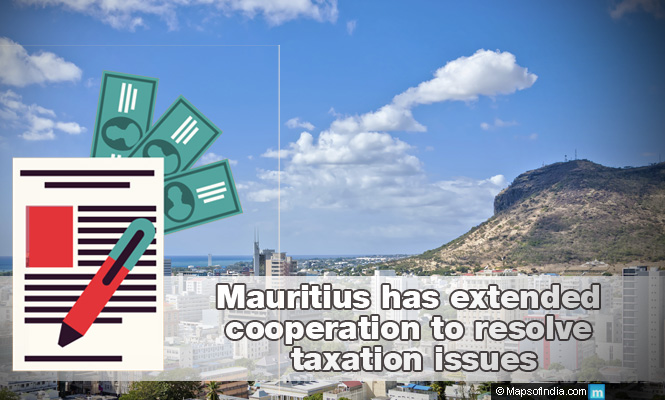At a time when Narendra Modi is at the receiving end of oppositions’ attack on the issue of black money, Mauritius, an African nation with which India shares strong historical, cultural, social, political and economic linkages, has assured New Delhi of cooperation in unearthing black money stashed away in the island nation’s bank. This assurance was given by Mauritian Foreign Affairs, Regional Integration and International Trade Minister Arvin Boolell during just concluded three-day visit of External Affairs Minister Sushma Swaraj to Port Louis.
It should be noted that the Central government has so far submitted to the Supreme Court a list of 627 foreign bank account holders’ names with details about their black money stashed away in offshore banks. Given that Mauritius is one of the major destinations for black money source, such assurance, according to experts, is bound to boost India’s slow but steady drive to bring noose closer to those, who have parked their unaccounted money in the island country’s banks.
Loopholes in old-time taxation relations with Mauritius
If SEBI, the market regulator is to be believed, Mauritius accounted for Rs 3.31 lakh crore worth of assets under custody of foreign institutional investors (FII) in the Indian equity and debt markets at the end of 2013. Foreign Direct Investment and FII routes are two significant gateways through which investments are made in the Indian markets.
Since 2012, New Delhi has been expressing its concerns that several Indian companies are routing their investments through Mauritius for round-tripping purpose. Round-tripping, a technical word, is usually referred to routing of domestic funds through Mauritius to take advantage of Double Taxation Avoidance Agreement (DTAA) between the two countries. This is an issue which is bone of contention between the two countries. India has sought amendment to the DTAA which is full of loopholes and is creating a huge problem for the Indian economy. Port Louis has assured New Delhi of its support in bringing amendment to DTAA.
All this took place during Sushma Swaraj’s official trip to Mauritius, the African nation which celebrated 180th anniversary of the Apravasi Diwas, the United Nations’ funded international conference to commemorate arrival of indentured labourers from colonial India and other places to Mauritius. On 2 November 1834, the first group of indentured labourers from India had landed on the shores of Mauritius. They were carried by a ship called MV Atlas.
At the Apravasi Diwas, the External Affairs Minister not only paid tributes in glorious terms to those Indians who were 180 years ago brought here to work in sugar fields, but also highlighted deep cultural linkages the two countries share between them. Indeed, it is historicity of these linkages that still invigorate bilateral political, economic and strategic relations of the two countries. Prime Minister Narendra Modi’s invitation to Mauritian Prime Minister Navinchandra Ramgoolam along with SAARC nations’ head to participate in his government’s swearing-in in May, was illustrative of the two countries’ unshakable bonding. And it got further synergized by the External Affairs Minister’s visit.
However, high mark of the visit was not just limited to reviving their old connections, but strengthening their strategic and economic ties also. It should be noted that they are close defence partners with which India has recently entered into defence deals also. Since the 1980s, India has been main cog to the island country’s security apparatus. Then it is India’s key strategic partner in the Indian Ocean. The two countries have occasionally conducted joint naval exercises in the Indian Ocean, through which more than 80 per cent of goods are imported and exported by India.
Three Indian Navy ships namely, INS Mumbai, INS Deepak and INS Talwar are today docked in Mauritian waters with view to qualitatively ensure peace, stability and maritime security in the Indian Ocean region. It has been rightly said that such move to deploy Indian navy ships in the Mauritian waters will go a long way in further strengthening the two countries’ cooperation in defence sector. Needless to say, it is mutual trust and faith between them and their overarching interest to safeguard economic and territorial integrity, is what is encouraging them to enhance their defence and strategic partnership. Each year more than a hundred Mauritian defence personnel receive training from India, indicating their commitment to enhance their bilateral engagement.
Bettering the mutual cooperation
On the economic platform, the two countries’ relations are beyond description. Today, Mauritius is the second largest investor in India after the US. More than 80 billion US dollars worth of investments has so far flowed into India. In comparison, Indian companies have invested in a limited manner in Mauritius. In the last five years, Indian companies have made 200 million-dollar worth of investments in this African country. Besides, the issue that got overwhelmingly highlighted by the minister during the three days’ visit was the vast investment opportunity that India offers now to the world.
In this regard, Sushma Swaraj highlighted the Indian government’s plan to set up 100 smart cities, develop dedicated freight and industrial corridors, revamping railways, power generation plants, cleaning Ganga and other rivers and revamping agriculture sector. While addressing Mauritian businessmen, she talked about New Delhi’s commitment to improve business environment by undertaking speedy decision taking measures. To this regard, she also talked about launch of “Make in India” campaign. Her stand was that this initiative has opened up enormous prospects for the global business community to take advantage of Indian economy which is showing signs of recovery with growth rate touching 5.7 per cent for the April-June quarter.
In fact, India wants to reach out to Mauritius in a comprehensive manner. It is engaged in various capacity building measures of the Indian Ocean country which is virtually a gateway to India’s growing penetration to the African countries. But all this is because of the fact that the two countries’ share commonality on several fronts. They are both thriving democracies of the world, and they share common perspective on peace and stability front too. And these fundamentals further received a boost during Sushma Swaraj’s visit.(end)





